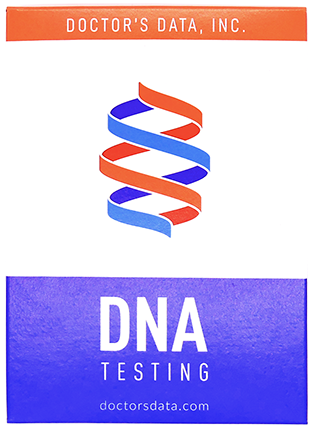
The FindWhy™ Weight Control test identifies DNA variations called single nucleotide polymorphisms (SNP’s) and is based on a detailed analysis of the scientific literature. This test is a risk assessment test and is not a diagnostic test. The test does not guarantee weight loss by following a particular dietary strategy, nor does it provide obvious benefit from choosing one diet over another based on the test results. This test is designed to shed light on an individual’s genetic background, and therefore allow patients to create a weight loss plan that will help overcome possible predispositions, and to help them achieve lasting results. [ LEARN MORE]
7 to 14 days
Note: Turnaround times on results are an estimate and are not guaranteed. The lab may need additional time due to holidays, confirmation/repeat testing, etc. You can contact us to discuss when your results should be ready.
Doctor's Data offers profiles containing multiple analytes. *Multiple analytes may be billed under a single CPT code. Many analytes can be ordered individually. Pricing may vary. Click on a specific analyte for more information or read our detailed billing and payment policies.
The CPT codes listed on our website are for informational purposes only. This information is our interpretation of CPT coding requirements and may not necessarily be correct. You are advised to consult the CPT Coding Manual published by the American Medical Association. Doctor's Data, Inc. takes no responsibility for billing errors due to your use of any CPT information from our website.
Sign in at the top of any page to view pricing and order tests. Or click here to create an account. You may also contact us for assistance placing an order.
Science has made great advances in understanding causes of obesity including identifying environmental causes as well as genes that may be implicated. Major scientific effort is now directed toward assessing the interactions of genes and environment in the current obesity epidemic. Obesity results when body fat accumulates over time as a result of a chronic energy imbalance (calories consumed exceed calories expended). Obesity is a major health hazard worldwide and is associated with several relatively common diseases such as diabetes, hypertension, heart disease, and some cancers.
In recent decades, obesity has reached epidemic proportions in populations whose environments offer an abundance of calorie-rich foods and fewer opportunities for physical activity. Although changes in the genetic makeup of populations occur too slowly to be responsible for this rapid rise in obesity, genes do play a role in the development of obesity. It is thought that genes regulate how our bodies capture, store, and release energy from food including the drive to overeat (poor regulation of appetite and satiety); the tendency to be sedentary (physically inactive); a diminished ability to use dietary fats as fuel; and an enlarged, easily stimulated capacity to store body fat.
Not all people living in industrialized countries with an abundance of food and reduced physical activity are or will become obese; nor will all obese people have the same body fat distribution or suffer the same health issues. This diversity occurs among groups of the same racial or ethnic background and even within families living in the same environment. The variation in how people respond to the same environmental conditions is an additional indication that genes play a role in the development of obesity. This is consistent with the theory that obesity results from genetic variation interacting with shifting environmental conditions.

| View Sample Report | |
| Collection Instructions | |
| Detailed Information | |